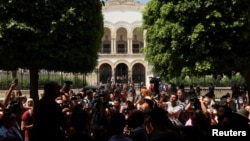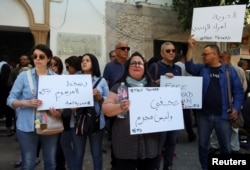A Tunisian court on Wednesday sentenced two journalists to one year in prison on charges of publishing false news that harms public security, a judicial official said, amid growing fears of a crackdown targeting all critical voices.
Mourad Zghidi and Borhan Bsaiss, both journalists with IFM radio, were detained this month over political comments made on the radio.
Tunisia has now imprisoned a total of six journalists, including Zghidi and Bsaiss, while dozens of others face judicial prosecution, according to the national journalists syndicate, which is the country's main union for journalists.
In May, police arrested 10 people, including journalists, lawyers and officials of civil society groups, in what Amnesty International called a deep crackdown targeting activists and journalists. Human Rights Watch has called on Tunisia to respect free speech and civil liberties.
"The judge decided to imprison them for a year following social media posts and radio comments that harm public security,” said Mohamed Zitouna, the Tunis court spokesperson.
Lawyers for Bsaiss and Zghidi were not immediately available for comment.
During his trial session, Bsaiss said, “I am a program presenter who presents all issues, and what I did was journalistic work.”
Zghidi also defended himself during the session.
“I did not make a mistake. .... My work requires analyzing the political and economic situation ... and I bear my responsibility,” he said.
Tunisian journalists gathered near the court on Wednesday, demanding an end to ongoing restrictions against journalists.
“Tunisia has become an open prison for journalists," said Zied Dabbar, head of the national journalists syndicate.
"Threats and restrictions facing journalists in Tunisia are unprecedented. We will move to escalation,” he added, without giving details.
Since Tunisia's 2011 revolution, the country has been considered one of the more open media environments in the Arab world.
But politicians, journalists and unions say freedom of the press faces a serious threat under the rule of President Kais Saied, who came to power following free elections in 2019.
Two years later, he shut down the elected parliament and moved to rule by decree. He also assumed authority over the judiciary, a step that the opposition called a coup.
Saied rejects accusations of authoritarian rule and says his steps aim to end years of chaos and corruption.






